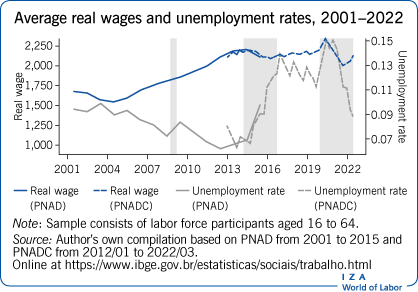Discurso de ascensor
In the first decade of the 21st century, the Brazilian economy experienced an important expansion followed by a significant decline in inequality. The minimum wage increased rapidly, reducing inequality with no negative effects on employment or formality. This resulted from economic growth and greater supply of skilled labor. However, from 2014-2021, real wages were stagnant, and unemployment rates surged. Inequality rose again, although only marginally. Some positive signs emerged in 2022, although it is still too early to know whether they mark a return to past trends or a recovery from the pandemic.

Hallazgos clave
Pros
Unemployment rates are declining and are now lower than the pre-pandemic levels.
Real wages declined rapidly during the pandemic but are now recovering.
Average years of schooling continue to rise, following the trend of the past decades. Returns to schooling continue to decline, contributing to reducing inequality.
Gender and racial earnings gaps have reduced substantially since 2001.
Contras
The recession that started in 2014 caused real wages to stagnate.
Although there has been a recovery in 2022, it is not yet clear whether it is a renewed upward trend or just the convergence towards pre-pandemic wage levels.
The long period of inequality reduction in Brazil came to an end in 2014.
It is possible that factors that allowed inequality to decline in the 2000’s will not be effective in the coming years.
The share of formal labor workers reached a peak right before 2014 and is now declining.